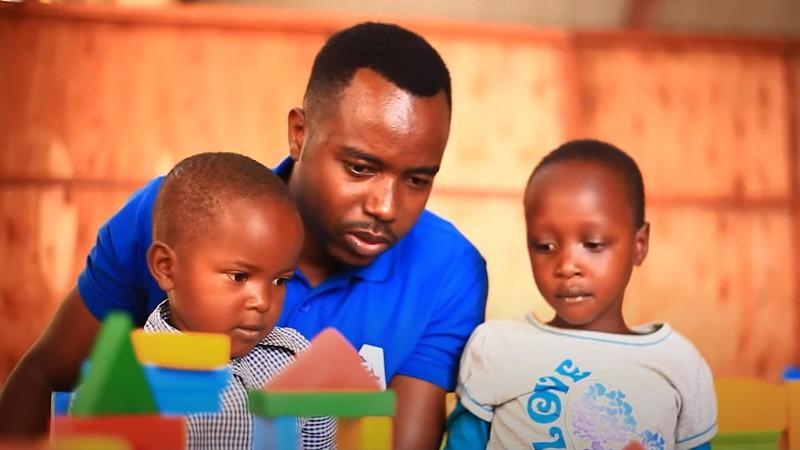Westminster academics’ non-governmental organisation (NGO) Shibuka held their inaugural showcase to celebrate the new business models of their young Rwandan entrepreneurs to overcome the coronavirus pandemic.

On 27 July, the coaching programme concluded in a showcase event, where entrepreneurs Bayingana Bonfils of Africa Educational Toys, Ishimwe Christelle of Nish, Segond Fidens Iragena of Park&Pick, Wilson Habimana of Wilson Tours and Idekwe David of Uhuru Clearing Agency presented their business models and celebrated their ability to overcome obstacles caused by the COVID-19 pandemic.
Shibuka is an NGO committed to developing strong and sustainable made-in-Rwanda young entrepreneurs through a range of interventions. Deborah Rose and Darrell Kofkin, who co-founded the organisation, have been running business clinics, known as Kwa Muganga sessions, for knowledge exchange and encouraging the entrepreneurs to look more in depth at their business practices. As a result, the entrepreneurs have gained the ability to persevere through the pandemic, something they initially felt was impossible, and celebrate their success.
The showcase event was attended by around 60 guests from across the world including University of Westminster colleagues, authors and advisors, and Government of Rwanda representatives, including Emmanuel Ruhumuliza, Partnerships Manager from the Rwanda High Commissioner to the UK, and from the Government of Rwanda Ministry of Information Communication Technology (ICT) and Innovation Angelos Munezero, Director General of Innovation representing Honourable Minister Paula Ingabire.
Shibuka was developed with Higher Education Innovation funding and Quintin Hogg Trust funding from the University of Westminster. The team previously held their first all-online Kwa Muganga in May 2020.
In the Kwa Muganga sessions, Rose and Kofkin discussed the obstacles and tensions of COVID-19 whilst considering changing business processes, finding new customers and talking to existing customers. They also encouraged the entrepreneurs to tell their stories on social media, which they found particularly helpful and have fed back into their own communities.
The trust-building in the early sessions with Rose and Kofkin helped to hone their problem-solving abilities and think beyond the potential devastation of COVID-19 by rebuilding their confidence and allowing them to express their frustrations with empathy.
As a consequence of Shibuka’s help and their own initiative, none of the entrepreneurs have had to let any of their staff go during the pandemic. Segond Fidens Iragena was in fact able to employ more people due to reflection on his business processes.
Over the past five weeks, the young entrepreneurs have been crafting the story of their revised business models in inspiring sessions with London-based filmmaker Dan Johnson, who guided them through recording videos that solidified in their own minds what they wanted to celebrate about their businesses. It was through considering the setting, goals, actions and how they overcame obstacles that the storytelling aspect of the film enabled the entrepreneurs to retrace in their minds what it means to run a business and how to find a new way forward. Rose then helped shape the narrative to achieve the final version of the film.
Shibuka has allowed the entrepreneurs to collaborate not only with each other, but also with industry experts such as brand management expert Professor Kevin Lane Keller, Dr Spinder Dhaliwal, author of The Millennial Millionaire, Dr Svend Hollensen, Professor of Global Marketing at the University of Southern Denmark, Dr Johann Fueller, Chair of Innovation and Entrepreneurship at the University of Innsbruck, Karen Dillon, the former Editor of Harvard Business Review, innovation expert Professor Gillian Youngs.
This inspiring interaction is also being underpinned by a research study to assess and evaluate the Kwa Muganga itself led by Westminster’s Dr Nattida Srisaracam and Professor Terry Lamb.
Shibuka had planned to attend CHOGM 2020, the Commonwealth Heads of Government Meeting in Rwanda, where they were to present the work of the organisation. However, as the 2020 event was cancelled due to the pandemic, they are now looking forward to CHOGM 2021.
At the meeting they were to present their work with the entrepreneurs in Rwanda as well as a project with Dr Vincent Rich’s International Development Management MSc students and Harrow School, who partnered with Green Hills Academy in Rwanda to develop a business idea that would last long after the students had graduated.
One of the young entrepreneurs Segond Fidens Iragena said about the process: “I come back to the question of how we juggled with our activities, especially what I do today is delivering fresh fruit to businesses and homes and it would catch me when I had orders to deliver and I had first to make sure that, when you know you have experts in front of you who are going to tell you more about what is waiting for you in the next two or three weeks, you can’t afford to lose them. So you maybe delay one delivery but make sure you at least listen to the people who have some key tips, which are going to help you go through the tunnel [of COVID-19]. And you learn about yourself. You learn that you can take a lot on, even beyond what you expect to be able to handle. You’re excited to say ‘wow, if I’ve gone through this and survived, I think I will go to the next two to three years and will get to really stabilised things’.”
For more information about Shibuka please contact Darrell Kofkin at [email protected]. You can follow Shibuka on Twitter @Shibuka2020.
Watch ‘The Story of 5 Young Rwandan Entrepreneurs During COVID-19’ on YouTube.
Watch the full showcase on YouTube.
Find out more about filmmaker Daniel Johnson on his website.







